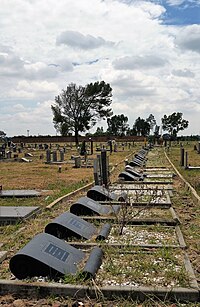| Sharpeville massacre | |
|---|---|
| Part of apartheid | |
 The row of graves of the 69 people brutally killed by police at the Sharpeville Police Station on 21 March 1960. | |
| Location | Sharpeville, Transvaal Province, South Africa |
| Date | 21 March 1960 |
| Deaths | 91 |
| Injured | 238 |
| Assailants | |
The Sharpeville massacre occurred on 21 March 1960, when police opened fire on a crowd of people who had assembled outside the police station in the township of Sharpeville in the then Transvaal Province of the then Union of South Africa (today part of Gauteng) to protest against the pass laws. A crowd of approximately 5,000 people gathered in Sharpeville that day in response to the call made by the Pan-Africanist Congress to leave their pass-books at home and to demand that the police arrest them for contravening the pass laws.[1] The protestors were told that they would be addressed by a government official and they waited outside the police station as more police officers arrived, including senior members of the notorious Security Branch. At 1.30pm, without issuing a warning, the police fired 1,344 rounds into the crowd. For more than fifty years the number of people killed and injured has been based on the police record, which included 249 victims in total, including 29 children, with 69 people killed and 180 injured. More recent research has shown that at least 91 people were killed at Sharpeville and at least 238 people were wounded.[2] Many people were shot in the back as they fled from the police.[3]
The massacre was photographed by photographer Ian Berry, who initially thought the police were firing blanks.[4] In present-day South Africa, 21 March is commemorated as a public holiday in honour of human rights and to commemorate the Sharpeville massacre.
In 2024, the area where the massacre occurred and the memorial became a World Heritage Site, known as Nelson Mandela Legacy Sites.
- ^ Lodge, Tom (2011). Sharpeville: an apartheid massacre and its consequences. The making of the modern world. Oxford New York: Oxford University Press. ISBN 978-0-19-280185-2.
- ^ Clark, Nancy L.; Worger, William H. (2023). Voices of Sharpeville: The Long History of Racial Injustice. London: Taylor & Francis Ltd. ISBN 978-1-032-19130-0.
- ^ Cite error: The named reference
Reeveswas invoked but never defined (see the help page). - ^ Macdonald, Fiona. "The photos that changed history – Ian Berry; Sharpeville Massacre". www.bbc.com. Retrieved 12 December 2018.